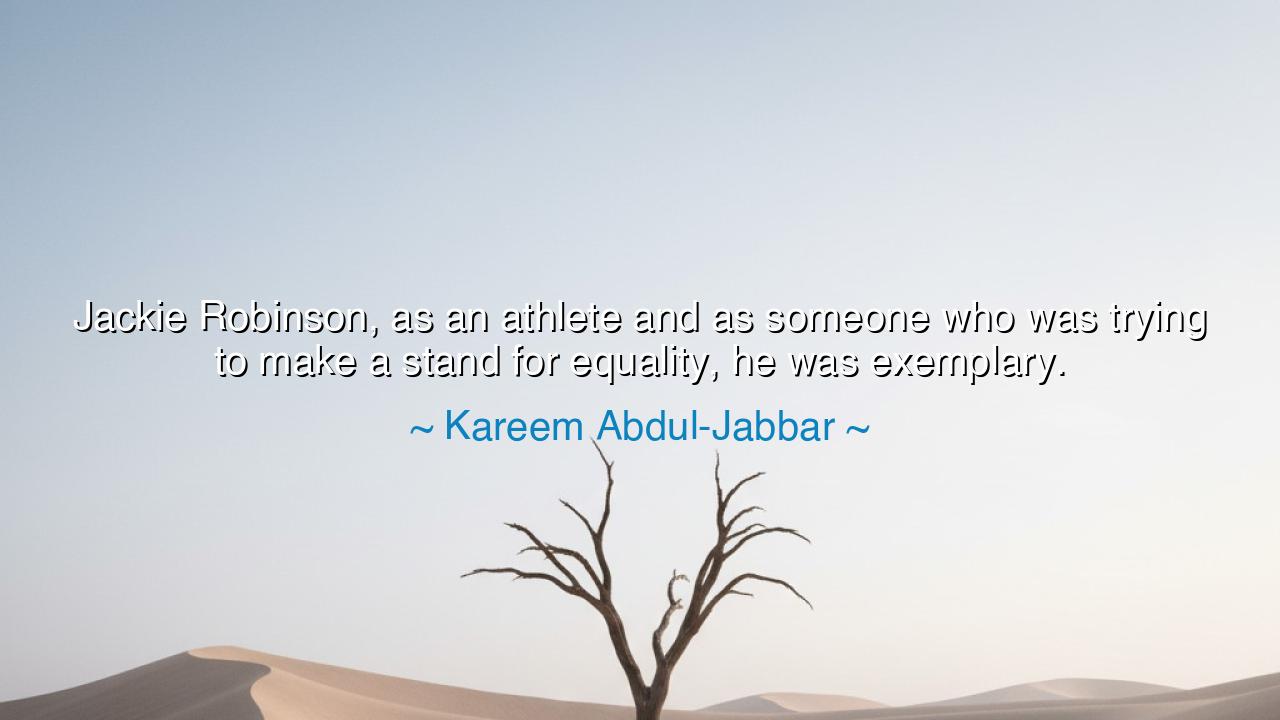
Jackie Robinson, as an athlete and as someone who was trying to
Jackie Robinson, as an athlete and as someone who was trying to make a stand for equality, he was exemplary.






Kareem Abdul-Jabbar, himself a titan of sport and conscience, once declared: “Jackie Robinson, as an athlete and as someone who was trying to make a stand for equality, he was exemplary.” In these words, Kareem does more than praise a fellow athlete—he lifts Robinson into the realm of the heroic, showing him as one who bore both the weight of his own career and the burden of an entire people’s hope. Robinson was not simply a ballplayer; he was a pioneer, a warrior who entered the battlefield of prejudice armed only with talent, discipline, and unshakable courage.
To call him exemplary is to say he embodied the highest standard, a model for those who would follow. His greatness was not confined to the diamond, though there he excelled with speed, precision, and brilliance. It was in the silence he maintained against insult, in the composure he held when spit upon, in the dignity he carried when cursed from the stands. In these moments, Robinson revealed the true meaning of strength: not in violence returned for violence, but in steadfastness, in refusing to bend to hatred. Kareem, who himself faced trials as a Black man in basketball, recognized in Robinson a mirror of endurance that transcended generations.
The origin of Robinson’s struggle lies in the long shadow of segregation in America. For decades, Black athletes were barred from Major League Baseball, forced to play in the Negro Leagues, their brilliance hidden from the wider stage. In 1947, when Robinson stepped onto the field for the Brooklyn Dodgers, he carried with him not only a bat and glove but the dignity of millions who had been told they were less. It was not simply a game—it was a crack in the wall of apartheid, a challenge to the lie of white supremacy. His every play became a sermon of equality, his every victory a prophecy of change.
History shows us the cost of such courage. Robinson endured threats to his life, jeers from the crowd, even resistance from some of his own teammates. Yet he persevered, not only winning Rookie of the Year but later Most Valuable Player, leading his team to championships. His athletic excellence silenced doubts, but his moral discipline broke barriers. Like Martin Luther King Jr., who marched with words instead of weapons, Robinson fought with the tools of his trade—his bat, his speed, his refusal to surrender his humanity. In this way, he was exemplary not just for athletes, but for all who seek justice.
Kareem’s praise carries special weight because he too was more than an athlete. He knew the sting of prejudice, the loneliness of standing apart, the challenge of using fame as a platform for truth. When he looks at Robinson, he sees not only a historical figure but a pathfinder who showed how greatness in sport could become greatness in society. Robinson proved that to excel in one’s calling while holding fast to equality is to shine twice—once for personal glory, and again for the uplift of a people.
The lesson is clear: to live an exemplary life is to use one’s gifts not for self alone, but for the advancement of others. Each of us may not face the crowds of a stadium, but we will face moments of injustice, moments where our composure, our courage, and our discipline are tested. In such moments, Jackie Robinson’s example speaks: endure with dignity, fight with your excellence, and stand firm for what is right, even when the world rages against you.
Therefore, let us act in the spirit of Robinson. In our workplaces, in our schools, in our communities, let us confront prejudice not with hatred, but with unwavering strength. Let us strive not only to succeed, but to make our success a beacon for others. And let us remember always that greatness is not measured solely in trophies or statistics, but in how one’s life opens doors for those who follow.
Thus Kareem Abdul-Jabbar’s words stand as a call to remembrance and to action: “Jackie Robinson… was exemplary.” To be exemplary is to be both hero and servant, champion and guide. And if we take his lesson into our own lives, we too may stand, like Robinson, as examples for generations yet unborn, living testaments to the enduring power of courage, excellence, and equality.






AAdministratorAdministrator
Welcome, honored guests. Please leave a comment, we will respond soon